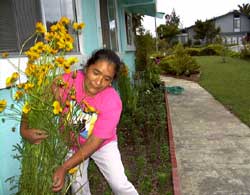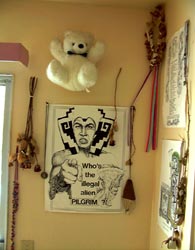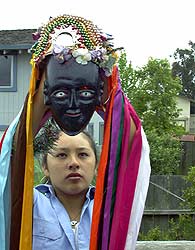|
WATSONVILLE, CA.
The
note was tacked to the garage door: "Since you Mexican wetbacks
arrived, our property values have gone to hell!" Then the garbage
cans turned over on her driveway. Rotten eggs and vegetables thrown
at the house....
It
was a five bedroom house, one story, twice as long as it was wide, almost
a block long, it seemed, with a wood-shingle roof, its walls painted
a rather drab green, but that didn't take away from its undeniable beauty...
American beauty, as in five-bedroom home, as in five-bedroom idyll,
and it was on a hill, a gentle rise overlooking the Pájaro Valley.

To listen to this
audio file you need the Quick
Time plug-in
This
had been Reyna Guzmán's más grande ilusión, her
biggest dream: a five-bedroom house: one room for each of her kids,
for Ignacio, the agronomist-turned-truck driver because his Mexican
degree was worthless in the U.S.; for Aaron, the son who married a Chicana,
much to Reyna's disappointment; for Iván, who at age 14 was flirting
with gangs and drugs, and worse, but who's calmed down and is now obsessed
with Native American spirituality; for Blanca, who she's hardly spoken
to since she ran off with a Chicano boy whose habits Reyna doesn't care
for; and for Beatriz, the youngest, who's following in Iván's
footsteps under the spell of a local Indian elder, and who's promised
her mom that she'll marry "right," back in Cherán,
to a local boy who fell for her the last time she visited, in a splendorous
Purépecha wedding, with the brass band and the processions and
her hair done up in ribbons and the vows in the church...
She
wanted the family under one roof. The realty agency announced an asking
price of $300,000–the going rate in neighborhoods like this one
in Watsonville, made of big houses occupied,
strangely, by small families, mostly Anglo families.
The
owners rejected her initial offer. She looked elsewhere, but nowhere
did she find the five-bedroom home of her dreams. But the realty eventually
called back: would she care to reinstate the offer, since the owners
hadn't been successful in selling to another party? She offered $200,000.
They accepted. She put $30,000 down and the house was hers.
At
first, the chilling reception from her neighbors depressed her to the
point of begging the realtor to tear up the contract. But then, she
thought, I've worked all my life to buy this house... and right then
she swore that the only ones who'd be moving out would be the neighbors.
Five years later, the prophecy has been fulfilled: the neighbor she
knew was behind most of the harrassment, a white police officer, has
placed a for-sale sign on his property. Soon he'll be gone.
Reyna
Guzmán is a lot like many of the Purépecha women that
I've come to know and admire. She is short in stature, but physically
quite strong, her upper arms thick with muscle. She is dark-skinned,
raven-haired. And, contrary to type, this Indian mother–single
mother–is anything but submissive. Reyna Guzmán is a dedicated,
if troubled, mom, and she is a fiery poltical activist and an entrepreneur.
She is tireless, agressive, outspoken and foul-mouthed when she needs
to be.

Reyna
speaks some Purépecha, Spanish, and a working English. She pronounces
"fuck you" quite well, actually. She said this one morning
to the wife of the police officer neighbor, who, as she walked past
Reyna as she was planting in her front yard, called out a hypocritically
cheerful "good morning" to her.
She's
been married three times. When I ask her if the men had abandoned the
family, as is sometimes (hell, often) the case with Mexican men, she
replied: "No, I kicked them out."
In
Reyna's life, the threads of many stories coincide, the stories of two
small cities, Cherán, Michoacán, and Watsonville, California,
two "prophetic" cities, whose importance is much greater than
their population statistics. Watsonville, as we wrote yesterday, has
been the site of political and labor struggles whose repercussions have
been felt far beyond the Pájaro Valley. So too, Cherán:
the most important town of the region known as the Purépecha
plateau, it has served as a hotbed of political activism (the opposition
PRD party won local elections there long before the much publicized
gains of the 1997 campaign), and, in the era of migration, become a
symbol of the rapid change, for better and worse, wrought by the ceasless
movement of people, commerce, and culture across frontiers.
She
first came north in 1973, practically dragged along by her first husband
(who she was married to against her will). She started off, like everyone
else, picking in the strawberry fields. But within a year she was leasing
four acres of land, overseeing 35 workers, and generating a $20,000
net profit each harvest.

But
from the beginning, she was ambivalent about her new life in the United
States.... "I spent 25 years thinking about going back to Cherán..."
Saving money and telling herself this is the year I'll return...
She
did return once, in the late seventies, when her children were still
quite young (Blanca and Beatriz weren't born yet, actually), and opened
up a restaurant. Despite a profitable start, she had to close down after
three years because of a series of unforeseen events–including
envious types and the Mexican bureaucracy conspiring against her.
Back
to Watsonville, and a job at the Watsonville Canning Company, packing
broccoli, caulliflower, spinach and chiles from six in the evening to
three in the morning, three hours of sleep and up to get the kids ready
for school... five years... without a vacation... and then the strike
began on September 9, 1985, at 5:00 a.m. It was a turning point in her
life.
There
is a photo in a local newspaper of Reyna, standing defiant against a
line or policemen, giving them the finger. She marched against City
Hall, she marched against the Teamsters, she marched against the bosses.
The strike lasted 18 months. And though few of their original demands
were met by the new owners of the company, they did keep their jobs–and
most important in Reyna's eyes, "we won respect."

She's
been involved in politics ever since. Helped elect Oscar Ríos
to the City Council after the redistricting made it possible to bring
a Latino to power. Led a boycott against the local McDonald's because
the owner, a Mexican woman, was a supporter of Proposition 187 (the
1994 ballot initiative that sought to deny public services to illegal
immigrants). Today, her front lawn is her political platform, sown with
signs supporting candidates and measures.
It
doesn't look like Reyna will be returning to Cherán any time
soon... and so she's brought Cherán to Watsonville. There is
an altar in her living room with candles and ribbons and the favorite
saints of the Purépechas, the Santo Niño de Atocha and
the Virgen de Guadalupe, and the masks worn by the Indians for the traditional
dances. There are posters announcing fiestas and competitions back home.
And in the kitchen there are glazed bowls brimming with the ingredients
for the same meals the Purépechas have been preparing for hundreds
of years–cilantro, onion, pasilla chile, cabbage...
She
prepares "churipo," a popular Purépecha meal (beef
soup with broth spiced up with red chile), for her guests. Tradition,
Reyna says, is important. Her daughter Betty helps in the kitchen. Tradition,
she says, acts like a vaccine against the contamination of influences
on this side of the border. She cites the example of her son Iván,
who appeared headed down a path of self-destruction in the gangs. She
encouraged him to visit Cherán. "He found himself there,"
Reyna says. He left the gang life behind.
On
the other hand, there are influences from this side of the border that
have undeniably helped the family.... it would have been difficult,
for example, for Reyna to have divorced her first husband back home,
and even more difficult to have married and divorced twice more after
that. She most certainly wouldn't have had the chance to become a labor
activist. She probably wouldn't have leased and worked a strawberry
field. And she probably wouldn't have been able to buy a five-bedroom
house.
The
thing is, only two of her children are home with her now, Iván
and Betty. Two of the bedrooms are empty. And because Blanca and Aaron
have troubled relationships with Reyna, even reunions are rare.
This
is Reyna's life: physically present in Watsonville, forever conjuring
up Cherán at her altars and in her meals and in the lessons of
"tradition" she's tried to teach her kids, even as the influences
of their new home pull at them.
It
is a classic immigrant story: she has lost some precious things, and
gained some others. It would be hard right now for Reyna Guzmán
to answer the question of whether the bargain was worth it. But then
again, who can?
Rubén Martínez
Share
your comments with us
|